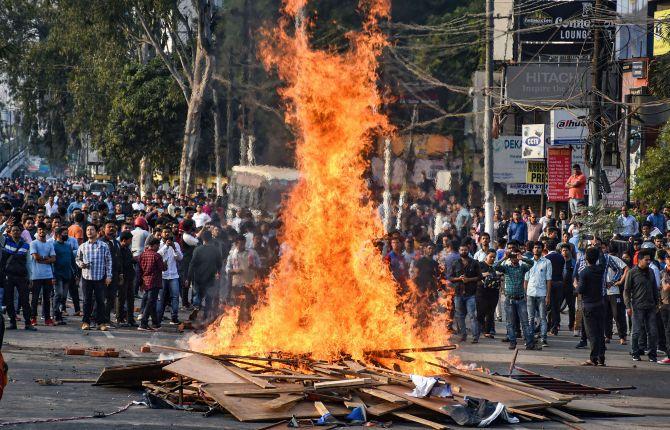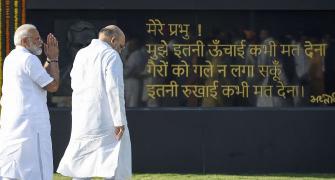'The majoritarian solution is what the BJP always prefers.'
'But this solution suffers from a major weakness: It ignores subjective preferences which can be important and non-negotiable,' points out T C A Srinivasa-Raghavan.

India now has a new set of rules for acquiring Indian citizenship. These new rules have brought about a political storm.
This could have been avoided if the BJP had consulted any economist specialising in choice theory, like say Amartya Sen who taught it at the Delhi School of Economics.
It would have been guided better in framing its Citizens Amendment Bill, which is now law.
From a purely legal and Constitutional point of view, the new law is fine.
But from a preferences point of view it comes up short.
The subject of preferences and their ordering have been studied threadbare by economic theorists over the last 125 years.
They know what they are talking about.
The preferences problem in the case of Assam for instance is this: The BJP prefers non-Muslims to Muslims, especially for migration, while the Assamese prefer Assamese to non-Assamese, regardless of religion.
The BJP would, therefore, have been told to solve two problems identified by economic theory.
One is called cyclical preferences.
The other is called combinative preferences.
Cyclical preferences are when A is preferred to B, and B is preferred to C, but C is preferred to A.
Combinative preferences are when the individual preferences of people in a group are involved and different combinations have to be taken into account, as when a group of people plan a holiday.
As the mathematician Frank Ramsey showed 90 years go, cyclical preferences can be exploited by any clever person, and politicians are usually cleverer than ordinary people.
A simple example of this is when when a stamp collector prefers stamp A to stamp B, stamp B to Stamp C and stamp C to stamp A.
He is also prepared to pay something -- in cash or kind -- to satisfy his preferences.
Any halfway decent dealer will keep offering exchanges for Rs 100 ad infinitum.
We have seen this happen to different groups over the last 70 years.
This process is known as the money-pump argument.
But for it to work, two conditions must be satisfied.
First, the primary alternatives (in this case the stamps) can be combined with some other commodity like money to form composite alternatives.
Second, a new offer is always preferred to the previous one.
This is exactly how the Congress achieved peace and tranquility in the north east between 1959 and 1985 and which the BJP has now disturbed.
The other problem is of conflict resolution within differing group preferences.
The key thing is here is that preferences are not mutually exclusive.
This makes it both easier and harder to solve the problem.
Economic theorists say such conflicts can be resolved in five ways.
One is to reduce all preferences to a single dimension represented by a number starting from 0 and going up to whatever.
The higher the number, the more preferred that option is.
The second is to assume that different preference conflicts cancel each other out.
But this can result in a weak preference cancelling a strong one, as happens with food preferences on a group tour.
The third is simply the majoritarian solution.
This is what the BJP always prefers.
But this solution suffers from a major weakness: It ignores subjective preferences which can be important and non-negotiable.
The fourth is the use of intuition.
You simply guess which alternative is most preferred.
Its main shortcoming is that it can lead to inconsistent outcomes, as can be seen in the new citizenship law.
Migrants from Bangladesh, Pakistan and Afghanistan acceptable, but not migrants from any other country.
The last is when everyone makes a compromise.
The Inner Line Permit extension to all north east states except Assam illustrates this.
And if Assam also manages to be an Inner Line Permit state, the compromise will be complete.
T C A Srinivasa-Raghavan is a Business Standard columnist.










